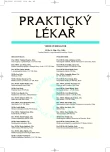Differential diagnostic of leucopenias
Diferenciální diagnostika leukopenie
Pojmem leukopenie označujeme celkové snížení počtu leukocytů v periferní krvi pod fyziologickou normu (4x109/l). Podle typu chybějících leukocytů rozlišujeme neutropenii či granulocytopenii, respektive agranulocytózu a lymfopenii. Neutropenie vrozené jsou vzácnější než neutropenie získané, které jsou nejčastěji způsobeny infekcemi či léky. Příčinou závažné získané neutropenie jsou především bakteriální sepse, infekční mononukleóza či virus hepatitidy B. Polékové neutropenie vyvolávají kromě chemoterapeutik zejména tyreostatika, antibiotika, analgetika / antiflogistika, neuropsychotropní léky. Dále nacházíme neutropenii u systémových chorob, hypersplenismu, při tvorbě antileukocytárních protilátek či infiltraci kostní dřeně maligním procesem. V diferenciálně diagnostickém postupu je vždy třeba posoudit stupeň a tíži neutropenie, eventuálně další početní či morfologické změny v krevním obraze, dynamiku vývoje a klinický stav pacienta. Cílem diagnostiky by mělo být zjištění příčiny neutropenie a její následné odstranění adekvátní terapeutickou intervencí.V přehledu jsou uvedeny možné příčiny leukopenie a návrh algoritmu jejího řešení.
Klíčová slova:
krevní obraz, diferenciální rozpočet leukocytů, leukopenie, neutropenie, agranulocytóza.
Authors:
J. Vondráková
Authors‘ workplace:
Přednosta: Prof. MUDr. Karel Indrák, DrSc.
; Hemato-onkologická klinika Fakultní nemocnice Olomouc
Published in:
Prakt. Lék. 2007; 87(5): 302-305
Category:
Diagnostis
Overview
The term leucopenia describes a decrease in the number of leucocytes in the blood circulation, defined as less than 4x109 per L (normal leucocytes level). Three deficiency states exist as defined by the type of leucocyte that is affected: neutropenia, granulocytopenia (or agranulocytosis) and lymphocytopenia. Neutropenia can be acquired or, less commonly, congenital. Acquired neutropenia is very often caused by infection or medication (drug-induced neutropenia). The most common cause of severe neutropenia is bacterial sepsis, viruses (infectious mononucleosis and hepatitis B virus). Drug-induced neutropenia usually results from exposure to chemotherapeutics, thyroid inhibitors, antibiotics, analgesics/antiinflammatory agents, or neuropsychotropics. In addition we can find neutropenia in patients with systemic diseases (lupus erythematosus), hypersplenism, antileucocyte antibodies or bone marrow infiltration. In the differential diagnostic process it is always necessary to assess the level and the extent of neutropenia, alternatively further numerical and morphological changes in blood count, dynamics of the disease, symptoms of infection etc. The cause of neutropenia should be determined as soon as possible to start the appropriate treatment. This survey shows a list of possible causes, evaluation and management of neutropenia.
Keywords:
blood count, leucopenia, neutropenia, agranulocytosis.
Labels
General practitioner for children and adolescents General practitioner for adultsArticle was published in
General Practitioner

2007 Issue 5
- Advances in the Treatment of Myasthenia Gravis on the Horizon
- Hope Awakens with Early Diagnosis of Parkinson's Disease Based on Skin Odor
- Memantine in Dementia Therapy – Current Findings and Possible Future Applications
- Memantine Eases Daily Life for Patients and Caregivers
- Possibilities of Using Metamizole in the Treatment of Acute Primary Headaches
-
All articles in this issue
- Acute renal failure
- Skin and alcohol
- Health promotion for ageing employees in the workplace
- Occupational Health and company practice
- Somatisation in childhood and adolescence
- The impact an educational film has on secondary school pupils’ knowledge of cardiopulmonary resuscitation
- Nurses and delirious states in hospitalized patients
- Serum tumour markers in the era of development of molecular biology techniques in oncology
- Diabetes mellitus as one of the risk factors for colorectal carcinoma. Role of PPAR receptors
- Differential diagnostic of leucopenias
- General Practitioner
- Journal archive
- Current issue
- About the journal
Most read in this issue
- Differential diagnostic of leucopenias
- Skin and alcohol
- Somatisation in childhood and adolescence
- Acute renal failure
